
Were you ever confused with a pimple on your face and a boil on your body? Symptoms for both are the same. Both look reddish and swollen. The only difference is that with time, a boil starts to grow larger and becomes excruciatingly painful. Before anything, let us learn about boils.
What is a Boil?
A boil is a skin infection caused due to bacteria. It starts in an oil gland. It is red, swollen and painful to human touch. Boils usually occur in the most sensitive area on the body. It occurs at areas where there is a lot of sweat, like armpits, neck, thighs, ear canal and buttocks. Did you know that boils are categorized into different types?
Types of Boils
There are several types of boils and each one of them can be broadly classified into four types.
- Furuncle or carbuncle is caused by staphylococcus aureus bacteria. It is accompanied by symptoms such as fever and chills. Carbuncle is a cluster of boils and can cause a severe infection. It usually affects older men
- Cystic acne is another type of boil. It can occur when the oil ducts gets infected. It can usually appear on the face and affect deeper tissue
- Pilondial cyst usually occurs on the buttocks. At the start, it appears as tiny infection at the hair follicle and becomes inflamed overtime. It can be quite painful and discomforting
- Hidradenitis Suppratavia can appear in the groin and armpit area. These types of boils can appear in cluster. And it can be formed due to inflammation in sweat glands. This is generally treated through surgery
What Causes Boils to Form?
There are many reasons that cause boils.
- It can happen because of ingrown hair, splinter, or any foreign material that gets stuck to the skin
- Other boil skin issues like acne are caused due to infected plugged sweat glands. The exact cause of boils cannot be determined, most often
- People with certain illnesses or with low immune system are more likely to develop boils
- Several medications can restrain immune system and raise the risk of developing boils
Are Boils Contagious?
There are several interpretations about boils being contagious. While there are few experts that say boils are not contagious, as they occur from bacteria dwelling in the skin. While, there are others that claim boils are contagious as it is transferrable from person to person. That can mean that if an infected person touches the skin of another person, they might have the chances to develop boils. It can depend because most people are most susceptible to boils.
Symptoms and Signs
Symptoms and signs of boils might usually include:
- A pea sized red and painful bump
- Swollen red skin around the bump
- Bump enlargement filled with pus in few days
- Skin becomes hard and painful around the boils
- Boils become itchy overtime
- A yellow white tip on the skin surface that ultimately burst open allowing the pus to drain out
Risk Factors of Boils
Any person can be inflicted with boils, but the following factors can increase your chances of developing boils:
- Living closely with a person with a staph infection or carbuncle
- A diabetic person is more liable to contract boils as their body becomes weak to fight off infection
- Skin problems such as acne and eczema damage skin’s protective layers, making a person more susceptible to boils
- A weak immune system can make it more susceptible for a person to contract boils and carbuncles
Home Remedies for Boils
Instead of damaging skin with ointment or relying on antibiotics, try few home remedies to cure boils instantly. Read ahead to learn about few natural home remedies for boils treatment:
1. Onions
What all you need?
- Onion slices
- surgical tape or clean cloth
Directions:
- Take a slice of the onion and place it directly on the affected area
- Wrap the onion with the surgical tape or clean cloth so that the heat of the onion reaches the skin
- Leave it on for few hours
How it works:
- Onion contains sulfur compounds with antimicrobial properties
- They also contain flavonoids and antioxidants to help protect and heal skin
Tip:
- Repeating this routine three or four time a day will drain the boils out. Also, use fresh slices with each trial
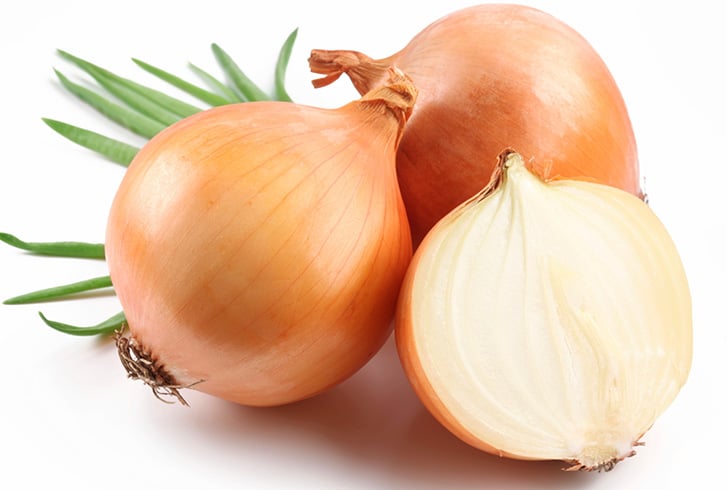
2. Indian Lilac (Neem)
What all you need?
- Fresh neem leaves
- Bandage
- Water
Directions:
- Crush the fresh neem leaves to make a fine paste
- Apply a layer of the neem paste and cover it with the bandage
- After a few hours, replace the old bandage with a new one
How it works:
- This remedy works because neem contains antimicrobial and anti-inflammatory properties
- These properties can reduce the boil from swelling and the pain that comes with it
Tip:
- Tea tree oil contains antimicrobial properties useful for killing the bacteria causing infection in the hair follicle
- It not only treats boil but also reduces the scars that boils can leave behind
Tip:
- Tea tree oil is the preferable remedy to treat boils. But do change the cotton swaps with each use
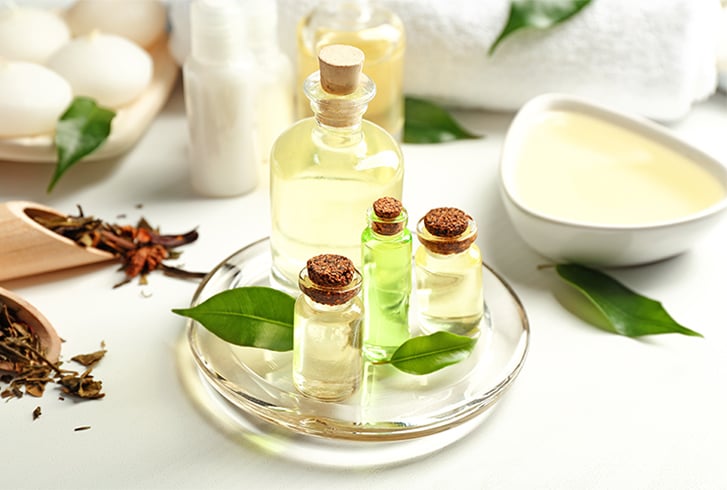
4. Turmeric
What all you need?
- Fresh ginger
- Turmeric
- Clean cloth
Directions:
- Mix fresh ginger, turmeric and water to form a fine paste
- Apply the paste in the boil and cover it with clean cloth
- Wash the area after 10-15 minutes
How it works:
- Turmeric has antiseptic properties that can heal skin infections and speed up skin rejuvenation
- Ginger also contains anti-inflammatory properties that can heal the boil faster
Tip:
- Repeat this remedy twice a week to see positive results
- Alternatively, mix one tsp of turmeric in warm milk. Drink it twice a day to heal boils
5. Black Seed Oil
What all you need?
- Black seeds
- Juice or hot herbal tea
Directions:
- Mix ½ tsp of black seed oil in hot or cold beverage
- Drink this mixture twice a day for few days
How it works:
- Black seeds contain medicinal properties that can help to cure skin diseases
- Make a paste out of black seeds. Apply it directly on the affected area
Tip:
- Green tea is a great beverage option for this remedy
6. Garlic
What all you need?
- 2 to 3 garlic
Directions:
- Crush 2-3 garlic and add few drops of water to form a fine paste
- Smear this paste directly on the affected area
- Set it off to dry for 10 minutes
- Wash off the paste with clean water and wipe with clean cloth
- Repeating this routine twice a day can speed up boil healing
How it works:
- Garlic is a great remedy for treating skin boils
- It contains anti-bacterial and anti-inflammatory properties that can not only cure boil but also alleviate the pain
Tip:
- Instead of making garlic paste, you can also consume 2-3 garlic cloves directly to heal boils

7. Epsom Salt
What all you need?
- Epsom salt
- Warm water
Directions:
- Fill your bath tub or small basin with warm water and add two cups of Epsom salt
- Stir it and soak the infected area in the water for few minutes
- Immerse out of the water and let it air dry
How it works:
- Epsom salt can help to seep out all toxins from the boil
- Warm water can aid in blood circulation and allow the boil to erupt
- Epsom salt can help drain out the moisture and kill the bacteria causing boils
Tip:
- Following this remedy once a day can recover the boils
8. Warm Compress
What all you need?
- Salt
- Washcloth
Directions:
- Dip a clean cloth in warm water
- Add salt to the warm water
- Press the warm cloth on the affected area for 10-12 minutes
How it works:
- Compressing the boil with warm can hasten bursting and healing
- It helps to kill the bacteria inside
Tip:
- Repeat this process six times a day
9. Castor Oil
What all you need?
- Castor oil
- Cotton balls
- Bandage
Directions:
- Add few drops of castor oil in a cotton ball and press it over the boil
- Cover it with a clean bandage
- Remove the bandage the next day
How it works:
- Castor oil contains anti-viral, anti-bacterial and anti-inflammatory properties that can help treat skin infections like boils
- This oil is also considered as an antiseptic for treating boils and drawing out the pus, right off the boil
Tip:
- Alternatively, place warm compress as soon as you apply the warm castor oil to the boils
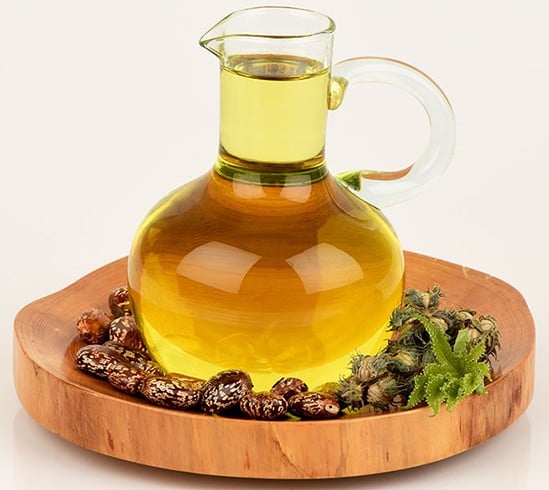
10. Echinacea
What all you need?
- 1-2 echinacea herb
- Warm water
Directions:
- Add Echinacea herb to a cup of warm water
- Steep the herb for few minutes
- Strain the mixture and drink the infused tea
How it works:
- Echinacea increases blood circulation and drain the lymphs
- This herb improves the immune system and fights against all skin infections
Tip:
- You can also apply this solution directly to the boils to create a numbing effect and relive you off the pain. Or, drinking the tea twice a day can really help
11. Potato
What all you need?
- 1 raw potato
- Cotton balls
Directions:
- Peel and grate 1 clean raw potato. Squeeze the juice out of the potato pulp
- Soak a cotton ball into the potato juice
- Dab the cotton ball into the affected area
- Allow the juice to soak into the boil
How it works:
- Its high concentration of iron, calcium, magnesium, Vitamin C and B can make it the most essential remedy for boils
- Potato also contains alkaloids and flavonoids that can improve skin issues like boils
- Its anti-inflammatory agents reduce pain, swelling and redness that accompanies boils
Tip:
- Repeat this remedy four to five times a day for immediate relief

12. Bread Poultice
What all you need?
- Bread Slice
- Warm Milk or water
- Bandage
Directions:
- Soak one bread slice in warm milk or water
- Take the soaked bread out of the mixture and place it directly on the boil
- Secure it with the bandage for 8-12 hours or keep it overnight
How it works:
- Covering a boil with a bread poultice will draw the pus out and infection
- It can also fix boils that are present under your skin. The bread poultice can help draw the pus out from the skin surface
Tip:
- Repeat this remedy twice a day for best results
13. Milk
What all you need?
- 1 cup hot milk
- Nutmeg powder
Directions:
- Mix one cup of hot milk and ½ tsp of nutmeg powder
- Stir the mixture well
How it works:
- Nutmeg can improve the blood circulation and prevent bacterial infection
- It also contains anti-inflammatory properties
- Milk can quickly draw out pus from the head of the boil
- Milk is also rich in Vitamin B6, Vitamin B12, lactic acid and proteins to nourish damaged skin
Tip:
- Repeat this routine regularly until you see results
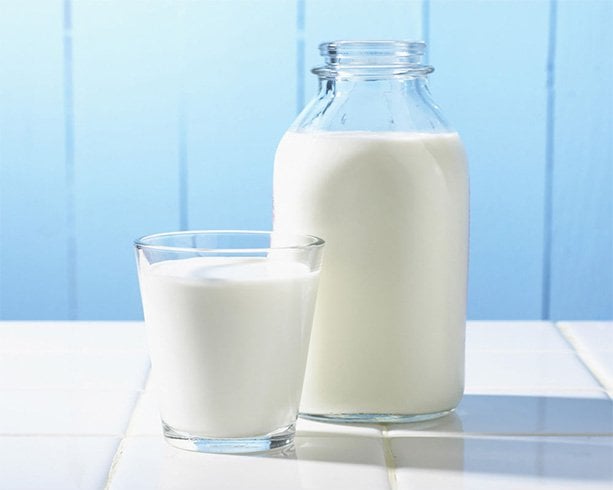
14. Cornmeal
What all you need?
- Cornmeal
- Clean cloth
Directions:
- Boil half cup of water and 2-3 tsp of cornmeal to make a thick paste
- Allow the mixture to cool down for sometime
- Apply the cornmeal paste over the affected area
- Cover it with a cloth
How it works:
- Cornmeal is absorptive and is an excellent home remedy
Tip:
- Repeat the routine every hour using fresh mixture and cloth. You will ultimately be able to draw out the boil pus
15. Egg Whites
What all you need?
- Egg white
- Clean cloth
Directions:
- Beat a hardboiled egg and separate the egg white. Apply the paste over your boils
- Seal the clean cloth over your boil
- Wash off with warm water after it dries off
How it works:
- Egg whites can help to drain off the pus from the boil and remove it completely from the skin
Tip:
- Repeat this remedy twice a day using hardboiled egg
16. Vinegar
What all you need?
- 1 tsp of white vinegar
- ½ tsp of honey
- ½ tsp of lemon juice
Directions:
- Mix all the ingredients together and apply it directly on the boils
- Wash off with warm after 30 minutes
How it works:
- Vinegar works as an astringent for boils
- Lemon juice and honey have antimicrobial agents. Honey acts like an emollient and soothes skin
Tip:
- Apply this remedy twice a day for effective results
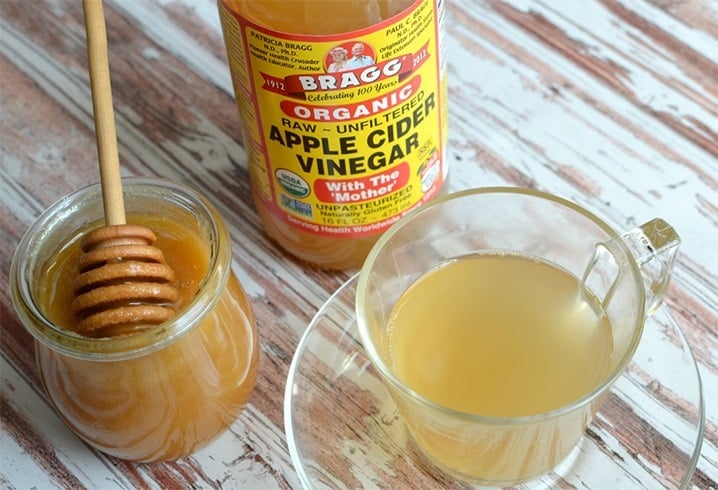
17. Cumin Seeds
What all you need?
- 50 grams cumin seeds
- Water
Directions:
- Grind 50 grams of cumin seeds and add water to form a fine paste
- Smear the paste over the boils
- Set it off to dry
How it works:
- Cumin seeds can help dry out boils and drain out pus
- It can also reduce the pain, inflammation and swelling associated with boils
Tip:
- Try this remedy daily until the boil completely heals
18. Parsley
What all you need?
- Fresh parsley leaves
- 2 cups of water
- Clean cloth
Directions:
- Heat two cups of water for five minutes. Add a handful of parsley to it
- Set it off to cool
- Crush the leaves to form a smooth paste and smear it over the boils
- Leave it on for few hours and remove with clean cloth
How it works:
- Parsley leaves contain antibacterial and antifungal agents that can help fight bacteria causing boil infection
Tip:
- Apply this remedy regularly to soothe inflammation and skin irritation caused by boils
[sc:mediad]
19. Vitamins A and E
What all you need?
- Vitamin A
- Vitamin E
Directions:
- Have Vitamin E foods such as peanuts, almonds, sunflower seeds, watermelon seeds, salmon, liver, etc to treat boils
- Include foods rich in Vitamin A in your daily diet such as leafy vegetables, beef liver and bell pepper
How it works:
- Vitamin A plays an important role in maintaining healthy skin surface and preventing boils
- Vitamin E contain antioxidant agents that can help increase immunity and treat skin infections as boils
Tip:
- Have a diet rich in Vitamin A and E to strengthen immune system and prevent boils
20. Aloe Vera
What all you need?
- Aloe vera gel
Directions:
- Break an aloe vera in half and take out the sap
- Apply the aloe gel over the boils
How it works:
- Aloe vera gel has antiseptic properties and offers quick relief to boils pain
Tip:
- Use the aloe vera gel daily twice a day until the boil starts to heal
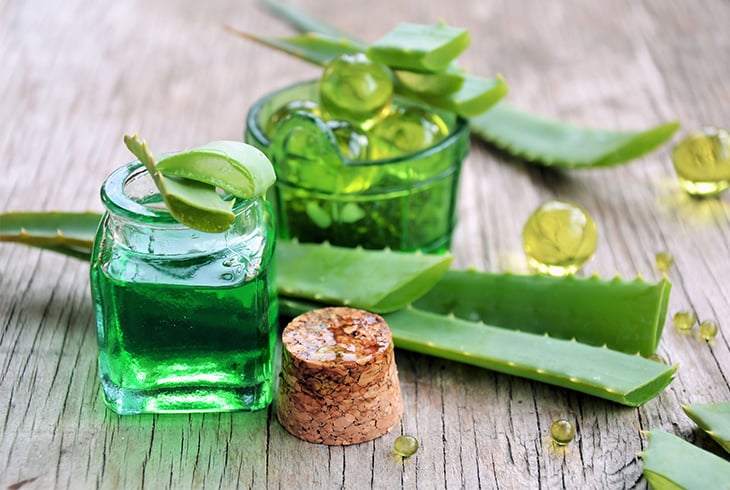
21. Toothpaste
What all you need?
- Toothpaste
Directions:
- Smear toothpaste over the boil and leave on for few minutes
- Clean the area with warm water
How it works:
- Toothpaste can help to absorb moisture from the affected area and speed up healing process
Tip:
- Try this remedy for a day to see instant results
22. Apple Cider Vinegar
What all you need?
- Apple cider vinegar
- Water
Directions:
- Mix equal amounts of apple cider vinegar and water
How it works:
- It corrects the pH level of the skin to heal the boils faster
- Apple cider vinegar contains disinfectant properties that can effectively cleanse the bacterial infection
Tip:
- Follow this remedy regularly for best results

23. Burdock Root
What all you need?
- 2 tsp of dried burdock root
- Water
Directions:
- Bring water to boil and add the dried burdock root. Allow the water to boil for 30 minutes in low flame
- Set it off to cool for 10-15 minutes
- Strain the tea
- Use the mixture to either drink or apply directly on the boils
How it works:
- Burdock roots contain anti-inflammatory properties that can purify blood by flushing body toxins and clean skin infections
Tip:
- Try this remedy 3-4 times a day
24. Betel Leaves
What all you need?
- One betel leaf
- Castor oil
- Bandage
Directions:
- Warm the betel leaf over open flame. Apply the castor oil over the leaf
- Apply the warm leaf over the boils
- Secure it with a clean bandage
How it works:
- Betel leaves has antiseptic properties derived from chavicol
Tip:
- Repeat these steps every few hours to speed up healing process
25. Nutmeg (Jaiphal)
What all you need?
- ½ tsp of nutmeg
- 1 cup of hot milk or warm water
Directions:
- Mix half a teaspoon of nutmeg to a cup of hot milk or warm water
How it works:
- Nutmeg contains antiseptic and antibacterial agents to treat boils
Tip:
Drink this nutmeg mixture daily until the infection subsides
26. Eucalyptus Oil
What all you need?
- 25 grams of elm powder
- 3 drops eucalyptus oil
Directions:
- Mix three drops of eucalyptus oil in 25 grams of elm powder
- Apply this mixture onto the boils
How it works:
- Eucalyptus oil contains anti-inflammatory properties useful for treating boils
Tip:
- Repeat this remedy several times until the boils heal
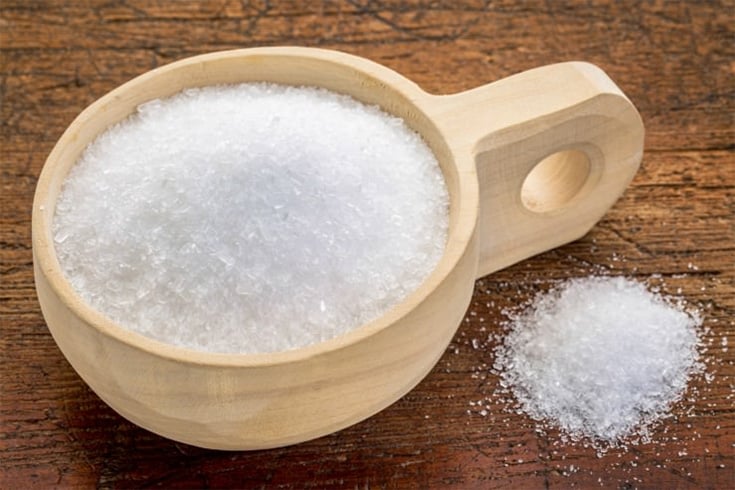
27. Bacon
What all you need?
- Bacon strips
Directions:
- Place bacon strips over the boil and let it sit for 10-15 minutes
How it works:
- The fat contained in bacon can help to open the boils effectively
Tip:
- Repeat this act for three to four days for complete healing
28. Jelly Jar
What all you need?
- Cup
- Tongs
- Cotton
Directions:
- Boil water in a small sized cup. Use a pair of tongs to pull off the cup of water
- Allow it to cool off
- Place the cup over the boils
- As the cup starts to cool down, the air suction will allow the boils to drain
- Blot using an antiseptic cotton wool
How it works:
- The air suction increases blood circulation to the area
Tip:
- Remember that the cup should not be too hot nor too cold
29. Japanese Honeysuckle
What all you need?
- 15-30 gram of dried honeysuckle stems
- Water
Directions:
- Place the dried honeysuckle stems in a bowl of water. Pour water over it
- Steep the mixture for few hours
- Strain using a sieve and apply the mixture to the boils. Rinse the area with this infused water
How it works:
- Japanese honeysuckle is a natural antibiotic and is great to treat boils
Tip:
- Rinse the area with this infused water several times a day
30. Marshmallow
What all you need?
- Marshmallow leaf
- Cotton
Directions:
- Crush few marshmallow leaves and extract the juice
- Apply the juice to the boils using cotton
How it works:
- Marshmallow herb can help take care of boils and remove pus from the skin
Tip:
- Try this step daily until the boil heals
31. Onion-Garlic Juice
What all you need?
- Onion
- Garlic
- Tea tree oil
- Bandage
- Cotton swab
Directions:
- Crush the onion and garlic and spread the mixture over the bandage
- Spread the dressing over the boils
- Use a cotton swab and tea tree oil to clean the pus
How it works:
- Onions can help to improve blood circulation and draw out pus from boils
- Garlic has antibacterial and anti-inflammatory properties to treat boils
Tip:
- Change the compress three times a day. Continue applying the tea tree oil to the affected area to prevent infection
32. Asafoetida (Hing) and Basil Leaves (Tulsi)
What all you need?
- Basil leaves
- Ginger
- Asafoetida
- Cotton swab
Directions:
- Grind few basil leaves and ginger to take out the juice
- Add a pinch of asafetida
- Apply the mixture on the affected area using a cotton swab
How it works:
- Basil has antimicrobial properties that can kill the bacteria causing boils
- Asafoetida also anti-inflammatory properties to prevent boils
Tip:
- Try this remedy twice a week for best results
When should someone seek medical attention for a boil?
Boils usually heal on their own and usually heal in a week or two. It rarely spreads or persists for long. But certain situations might call for medical help. For example, a person with diabetes might develop boils due to weakened immune system. In such a case, seeking help from medical professional can help. There are several boils that might heal without any treatment. But if you have to seek out for medical help, then consult a dermatologist or a primary care doctor.
Prevention
No matter how tempting it becomes to pop or squeeze boils, do not ever do it. Squeezing the skin can cause deeper skin infection. However, there are quite a few measures to prevent boils from spreading. These options are simple, natural and cost-effective.
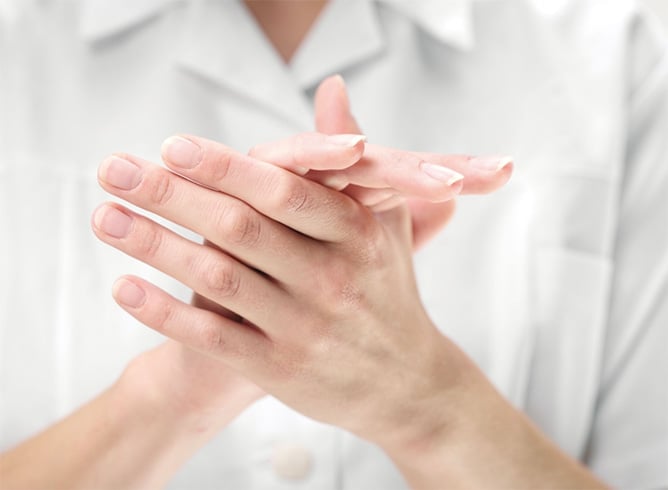
Tips
- Make use of antibacterial soaps regularly and maintain a good hygiene. Doing so can help prevent the chances of hair follicles to become infected and boils formation
- Homeopathy can naturally treat boils. The best remedies to get rid of boils can include belladonna and Hepar sulphuris calcareum
- Maintaining a healthy diet can prevent boil formation and speed up healing process. So, cut down on sugar in your diet to prevent boils
- Clean the affected skin well. Even a small wound like scratches can spread skin infection and cause boils
These are few of the ways you can prevent and treat boils at home.
Recommended Articles
How to Avoid Clogged Pores
How to Remove Moles
How to Get Rid of Crepey Skin

4 comments
Hi.. I am a diabetic patient and having boils very frequently. Is there any connection between diabetes and boils?
People with diabetes and kidney failures are more likely to develop boils, as their bodies are deficient of a few necessities.
I am frequently having boils in my nose and its so painful. Can you tell me the reason?
There are number of reasons why the nose boils are repeatedly coming. It could be :
– Picking your nose with dirty hands. As dirty hands can spread bacteria.
– Squeezing the existing nose boil which lets the infection spread.
– Underlying diseases such as HIV, diabetes or immune system disorder.